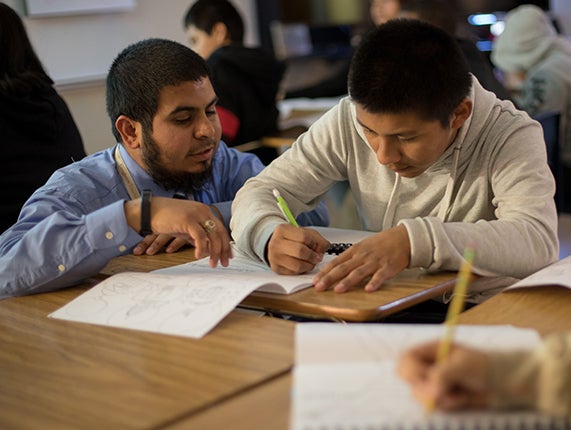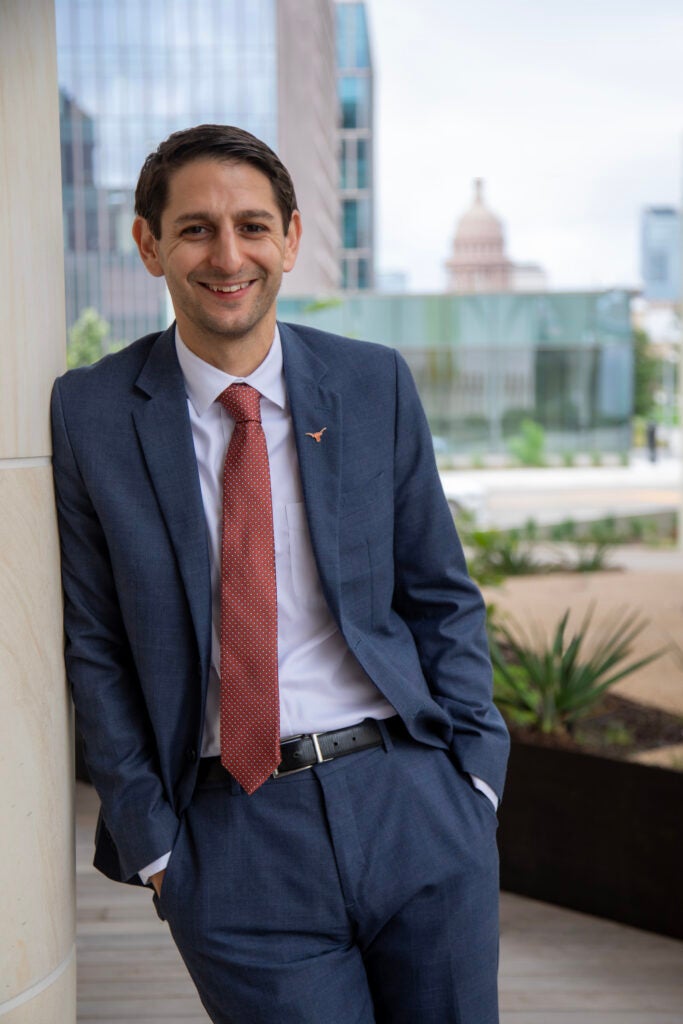
Texas Education
Leadership Lab
The Texas Education Leadership Lab (TELL) is uniquely focused on conducting timely and rigorous research focused on district and school leadership to help improve Texas schools. We are actively studying the principal and teacher workforce, inclusive leadership for students with disabilities and emergent bilinguals, school finance, and the impact of state and local policies on the work of district and school leaders. Our efforts to improve Texas schools does not stop when the research is complete – our team is committed to building deep partnerships, sharing information, communicating lessons learned, and advocating for evidence-based policies.
Impactful Research
11,000+
District and School
Leaders
8,900+
Texas
Public Schools
1200+
Texas
School Districts
- Texas Charter Growth and Special Education: Insights from Major Cities and Large CMOs: This report uses longitudinal data to illuminate statewide and city-level trends in charter growth and special education as well as assess differences in special education enrollment and spending between charter management organizations and school districts.
- The Texas Special Education Report: This report uses longitudinal data to evaluate key implementation areas for the nation’s special education law, the Individuals with Disabilities Education Act. Findings cover student eligibility, special education teacher turnover, academic achievement, and public school and charter school enrollment patterns.
- The Texas Superintendent Workforce in Seven Graphics: The findings from our collaborative report with the Texas Association of School Administrators highlight the shifting demographics and ongoing trends among the superintendent workforce in Texas. The findings also include comparisons with other nearby states.
- The Texas Principal Workforce Report: The findings from our second report highlight the opportunities and challenges of supporting and developing our state’s assistant principals and principals. We provide unique insights into leadership demographics, time to principalship, and retention and turnover over 12 years. We also present timely recommendations to strengthen our state’s school leadership workforce.
- Principal and Teacher Turnover: Our study examined the extent to which principal turnover influences teacher turnover in Texas between 1999 and 2016. Teacher turnover spikes in schools experiencing leadership turnover, and these effects are greater among high-poverty and urban schools, in schools with lower levels of teacher experience, and in schools experiencing chronic principal turnover.
- Principal Preparedness for the Pandemic: Were principals prepared for the pandemic and who were they most concerned about? Our study draws upon a national survey and highlights that schools were generally unprepared for the pandemic. Many principals were most concerned about the pandemic’s impact on students with disabilities, English learner students, students experiencing poverty, and students who were struggling.
- Special Education in Texas: From 2014 through 2016, Texas engaged in the systematic delay and denial of special education to eligible students with disabilities. This study examines state and district special education data and describes how district leaders knowingly and unknowingly engaged in practices that harmed students with disabilities.
- Principals, Stress, and Finding Joy: Many principals are experiencing high-levels of job-related stress, especially after the pandemic and amid a shortage of high-quality teachers. To persist on the job, principals cannot only focus on the threats and challenges. Based on our prior research and research focused on positive psychology, we highlight a set of evidenced-based practices for principals to find joy in their work.
- Untapped Talent: An Eleven Year Analysis of the Texas Superintendent Workforce: The findings from our first report highlight the challenges and opportunities of supporting and developing the potential of our state’s
untapped leadership talent. We are excited about sharing and translating this research with different audiences and tracking these challenges and opportunities into the future.
We believe that education research has the potential to identify critical problems and help identify solutions to improve student achievement and other important outcomes. Our research projects examine pressing issues within the state of Texas.

Professional Development
We believe district and school leaders benefit from high-quality professional development, especially when working in challenging and high-needs contexts. Our Texas-based research provides unique insights that enables our team to develop and implement professional development that is timely and relevant. Presently, our research has led to professional development with district and school leaders in Texas and across the United States on addressing principal and educator burnout, creating inclusive schools for students with disabilities, and addressing racial disproportionately in discipline and identification into special education.
EDITORIALS/COMMENTARIES AND MEDIA APPEARANCES/INTERVIEWS
We believe that the public, policymakers, and media need access to high-quality and timely education research to inform their decisions. Our research and expertise are regularly shared in national, state, and local media.
Editorials/Commentaries
-
Linda McMahon’s haphazard cuts to the Department of Education will be costly. DeMatthews, D.E. (2025, May 17). The Hill.
-
Vouchers are the worst education policy money can buy. DeMatthews, D. E. (2024, May 29). San Antonio Express News.
-
The state can’t be trusted to improve Austin ISD
DeMatthews, D. E. (2023, October 2). Austin American-Statesman. -
Don’t believe polls that show Texans want school vouchers
DeMatthews, D. E., & Knight, D. S. (2023, July 23). Houston Chronicle. -
Taxpayer swindle: More states should not seek school vouchers
DeMatthews, D. E., & Knight, D. (2023, February 14). The Hill. -
We are facing a looming crisis of principal burnout
DeMatthews, D. E. (2021, October 21). Education Week. -
Standardized testing amid COVID-19 will do kids and teachers more harm than good
DeMatthews, D. E. (2021, March 10). USA Today.
Media Appearances/Interviews
-
This charter school superintendent makes $870,000. He leads a district with 1,000 students. Simani, E., & Churchill, L. (2025, March 6). The Texas Tribune/ProPublica
-
This state is bucking gender and race trends in school leadership. Banjeri, O. (2024, September 30). Education Week.
-
Texas took over its largest school district, but has let underperforming charter networks expand
Collier, K., & Keemahill, D. (October 10, 2023), ProPublica. -
Advocates of school choice pour campaign contributions into Texas
Garrett, R. (October 9, 2023), Dallas Morning News. -
Texas takeover raises back-to-school anxiety for Houston students, parents and teachers
Lozano, J. (2023, August 27), Associated Press. -
Texas revamps Houston schools, closing libraries and angering parents
Goodman, D. J. (2023, August 13), New York Times. -
State takeovers of ‘failing’ schools are increasing. Do they help students?
Yoder, S. (2023, August 4), Washington Post. -
Texas politicians say public schools are failing. Rural communities say otherwise
Cardona, M. (2023, March 28), Fort Worth Star-Telegram.
Ongoing Projects
TELL is continuously engaged in rigorous research, addressing critical issues in education and laying the foundation for transformative change. Our ongoing projects represent current TELL initiatives aimed at empowering policy decisions to create a lasting impact on the field of education.

TELL is currently seeking funding and support to expand our research focus on the three topics below. Your support enables our team to research Texas-specific education issues and translate our research findings into meaningful information and trainings that can improve Texas public schools.
- Principal Retention and Job-Related Stress: We are currently seeking seed funding to transition from a pilot study of principal health that will use unique medical devices to track principal sleep and health over the course of the school year. These findings will enable us to provide recommendations to improve principal preparation, in-service training, and policies to support principal retention.
- Where is Special Education Thriving in Texas?: As a state, Texas has been sanctioned by the U.S. Department of Education for failing to comply with the nation’s special education law and has made improper cuts to special education spending. However, we believe there are Texas public school districts and schools that have still managed to provide a high-quality, inclusive education to students with disabilities. We are currently seeking funding to support a longitudinal analysis of state data to identify districts and schools that are outperforming their peers in the area of special education. Findings from this study will enable us to better understand the steps district and school leaders can take to better serve students with disabilities.
- Rural Schools Matter: As Texas becomes more urban and suburban, much of the state’s energy and efforts have shifted away from serving rural districts and schools. Yet, more than 700,000 Texas children attend rural schools and our preliminary research suggests many of these schools have high levels of principal and teacher turnover. Unfortunately, the scale of the challenges confronting these schools are not fully documented. In addition, policymakers cannot learn from rural schools that are effectively managing these challenges because these schools have yet to be identified. Findings from this study will support rural education advocacy and lead to understanding effective practices principals can take to improve teacher recruitment and retention.
Team

David DeMatthews, Ph.D. is the W.K. Kellogg endowed professor in the Department of Educational Leadership and Policy at the University of Texas at Austin. Prior to arriving at UT-Austin, DeMatthews was an assistant professor at the University of Texas at El Paso.
He began his career in education working as a teacher, campus leader, and district administrator in Baltimore City Public Schools and the District of Columbia Public Schools. He has published over 150 research articles in academic journals, book chapters in edited volumes, research reports, and editorials in media outlets.
He regularly appears as a commentator on education policy issues in regional and national media outlets. His editorials have appeared in Education Week, USA Today, The Hill, The Dallas Morning News, Baltimore Sun, and Houston Chronicle.
Alexandra Aylward, Ph.D. – Fellow
Alexandra Aylward, Ph.D., is an assistant professor at the University of Nevada at Reno. Prior to her current position, Dr. Aylward was a research scientist at the University of Texas at Austin in the Texas Educational Leadership Lab. With her degree in Sociology of Education from New York University, Dr. Aylward’s research relies heavily on quantitative and mixed-methods approaches to investigate the relationship between social contextual factors and racial/ethnic inequity in educational opportunity. Currently, Dr. Aylward is leading the quantitative analyses, which draws on the Texas Education Research Center (ERC) longitudinal datasets, to provide insights into diversity and turnover of school leadership within Texas schools and how this relates to gaps in educational opportunity.
Torri Hart – Research Associate
Torri Danny Hart is a doctoral student in the Educational Policy and Planning program at The University of Texas at Austin. She holds a Bachelor of Arts in English and Secondary Education from Radford University and a Master of Arts in English from George Mason University. Inspired by her years as a secondary English teacher in suburban and rural communities, Hart’s research is centered in rural contexts. Hart’s research aims to understand how rural school leaders can use their leadership practices to support the recruitment and retention of teachers to create inclusive, equitable schools. Hart is interested in the intersections between educational policy, school leadership, and rurality to investigate how policy design can best support rural community needs. Hart is pursuing her doctorate in Educational Policy and Planning with the intention to support the development of rural-focused educational policy and leadership preparation that equips future education leaders for the diverse needs of rural schooling contexts.
David Knight, Ph.D. – Fellow
David Knight, Ph.D., is an associate professor of education finance and policy at the University of Washington College of Education. His research focuses on the economics of education and school finance. He studies educational systems through the lens of economic theory and methodologies. His work emphasizes distributive justice, racial/ethnic and socioeconomic finance equity, systematic racial segregation into under-resourced school districts, and policies aimed at reducing inequality and addressing longstanding racial and income-based disparities in educational opportunity. Knight’s work explores three foundational aspects of educational systems. The first examines how school systems are funded and whether resources are allocated equitably. In a recent study, he found that state education funding cuts following the Great Recession disproportionately impacted higher-poverty school districts. Other work in this area explores racial/ethnic and income-based funding gaps across schools in the same school district as well as funding disparities between charter and traditional public school districts. Knight’s second area of research examines educator labor markets.
Pedro Reyes, Ph.D.
Pedro Reyes, Ph.D., is passionate about teaching and research on student success. In his writing, Dr. Reyes focuses on Education and Opportunity, particularly on student success for children experiencing poverty. His work is focused on the intersection of leadership and policy with focus educator and administrator turnover and burnout. His research has focused on culturally and linguistically diverse, and often marginalized students such as, urban students, language learners, migrant students, and border students, among others. His academic work has transcended the “the blaming game” and has focused on what is possible with these students and their success in schools. Reyes has raised more than 23 million dollars in research development grants from foundations including: The Spencer Foundation, The Annenberg Foundation, The Spencer T. and Ann W. Olin Foundation, the Texas Education Agency, the National Science Foundation, the Houston Endowment, Inc., The Brown Foundation, and the U. S. Department of Education. Currently, he is the Executive Director of the Texas Education Research Center which mission is to maintain a longitudinal data system for the State of Texas; and to provide social scientists and other researchers access to such database to study and analyze significant questions to improve educational policy, educational outcomes, and labor outcomes within the confines of a highly secured environment.
Julie Means-Parker M.Ed. – Research Associate
Julie is a passionate and accomplished education professional with over 19 years of experience. She holds a graduate degree from the University of Texas College of Education Policy and Planning program, specializing in inclusive practices and positive outcomes for students with disabilities. Julie’s research focus reflects the importance of addressing the diverse and evolving educational landscape. Currently serving as a team member of the Texas Education Policy Lab, her dedication lies in overcoming access barriers by developing innovative solutions that cater to the unique needs and learning styles of all learners and fostering positive school-family relationships. Julie’s expertise has played a pivotal role in collaborating with school officials to design inclusive accommodation plans and developing science-based reading programs. Her valuable insights have also been shared with district leaders to inform decision-making processes.
Jinseok Shin, Ph.D. – Research Fellow
Jinseok Shin is a Research Fellow in the Department of Educational Leadership and Policy at the University of Texas at Austin. Prior to arriving at UT-Austin, Jinseok was a Post-doctoral Research Associate at the University of Washington at Seattle. He received his B.A. and M.A. from Sogang University in South Korea and his Ph.D. in Economics from the University of Texas at Austin in May 2018. His areas of specialization include Labor Economics and Applied Microeconomics, focusing on the Economics of Education.
If you’re interested in learning more or getting involved, please contact David DeMatthews. Together, we can work towards creating a brighter future for education.
